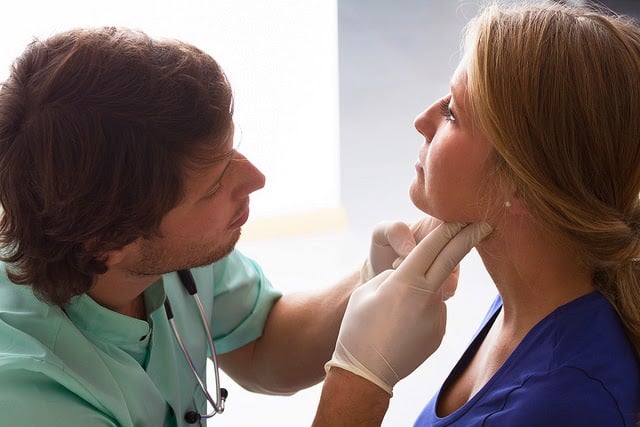The annual check-up is an important part of everyone's health. It's the chance for you and your doctor to be proactive and can often catch health issues before they become big problems. Many people feel they are too busy to take the time for an annual exam. Men in particular seem to feel that as long as they feel fine, there's no reason to see a doctor.

Seeing a doctor annually lets your doctor get to know you and your health history. Annual exams are also the perfect opportunity to stay on top of screening tests. Screening tests and a good relationship with your physician are two great ways to catch health issues early. Screening tests vary depending on your age and history but here are six important screening tests for adult men.
Prostate Cancer Screening
The prostate gland is located in the pelvic region, under the bladder and adjacent to the rectum. Your doctor will examine your prostate manually during your annual exam and if abnormalities are felt, may recommend blood tests or imaging to screen for potential cancer, benign hyperplasia or prostatitis. If you are experiencing the following symptoms, don't wait for an annual exam to see your doctor about your prostate.
- Frequent urination, including the need to get up often during the night to urinate
- Hesitancy in starting the flow of urine or inability to urinate - urinary retention
- Loss of force of the stream of urine
- Pain or discomfort while urinating
- Erectile dysfunction
- Pain with ejaculation
- Blood in the urine or semen
- Back pain or bone pain that is new and unexplained by recent injury or increased activity
- Urinary and/or fecal incontinence
These symptoms can also be caused by other, less serious conditions and do not necessarily mean that you have prostate cancer. It is important, however, to see your doctor if you are having any of these symptoms.
Learn more about prostate cancer >>
Testicular cancer screening
The testicles (or testes) are a pair of male sex glands that produce sperm and male hormones. They are located under the penis in a sac-like pouch called the scrotum. Your doctor will examine your testicles manually during an annual exam and if abnormalities are felt, may recommend additional screening such as blood tests, imaging, or a biopsy.
If you are experiencing the following symptoms, don't wait for an annual exam to see your doctor about your testicles:
- A painless lump or swelling in either testicle
- Enlargement or swelling of a testicle, or a change in the way it feels
- Feeling of heaviness in the scrotum
- A dull ache in the lower abdomen or groin
- Fluid or swelling in the scrotum, especially (though not exclusively) if it appears suddenly
- Pain or discomfort in a testicle or in the scrotum
- Lower back pain (in later stages of the cancer)
- Breast enlargement or discomfort (rare)
Note: Any of these symptoms may be caused by other, less serious health conditions. If you experience any one of them, see your doctor.
Learn more about testicular cancer >>
Colon cancer screening
The large intestine, or colon, absorbs water and nutrients from foods. There are rarely symptoms of colon cancer which is why the American Cancer Society recommends colon screening with a colonoscopy for everyone starting at age 50 (earlier based on your personal health history).
If you are experiencing the following symptoms, don't wait for an annual exam to see your doctor about your colon:
- A change in bowel habits
- Blood in the stool that is either bright red or black and tarry
- Stools that are narrower than usual

- Diarrhea, constipation, or feeling that the bowel does not empty completely
- General abdominal discomfort, such as frequent gas pains, bloating, fullness, and/or cramps
- Unexplained weight loss
- Constant feeling or fatigue or tiredness
Learn more about colon cancer >>
High blood pressure screening
High blood pressure is defined as systolic pressure greater than 140mmHg and/or diastolic pressure greater than 90 mmHg. You are considered prehypertensive if your systolic blood pressure is between 120-139 mmHg, or your diastolic pressure is between 80-89 mmHg. High blood pressure is more common in men, older adults, and people of African American descent. It is important to regularly measure your blood pressure because high blood pressure puts stress on the heart, lungs, brain, kidneys, and blood vessels. Over time, this condition can damage these organs and tissues.
Learn more about high blood pressure >>
Type 2 diabetes screening
Type 2 diabetes is a disorder in which the cells are not responding to the high levels of insulin circulating in the body. Type 2 diabetes occurs because either one or both of the following conditions exist:
- Fat, muscle, or liver cells do not respond to the high levels or insulin (called insulin resistance)
- Beta cells in the pancreas do not make enough insulin relative to the demands of the bod
People older than 45 years old are at higher risk of developing this condition, but it can occur at any age - even during childhood. Being overweight or obese is the primary case of insulin resistance, and it increases the chance of developing Type 2 diabetes. If diabetes is left untreated, serious health complications can occur. These complications affect the eyes, heart, kidneys, blood and nerve supply, and immune system.
In order to detect prediabetes and Type 2 diabetes, the American Diabetes Association (ADA) recommends the following guidelines. Screen adults of any age who are overweight or obese with one or more of these risk factors:
- First-degree relative with diabetes
- Low high-density lipoprotein (HDL) (good) cholesterol level and high triglycerides levels
- High blood pressure
- History of diabetes during pregnancy (gestational diabetes) or having a baby weighing over nine pounds (4.1 kg)
- Being inactive
- History of cardiovascular disease
- Belonging to an at-risk ethnic group (African American, Hispanic, Native American, Hispanic American, Asian American, or Pacific Islander)
- Previous blood test results that show HbA1c levels at 5% or higher, impaired glucose tolerance, and impaired fasting glucose
- Screen adults ages 45 and older, with or without risk factors
If the results are normal, the ADA recommends screening again in 3 years
Cholesterol screening
There are different types of cholesterol in your blood including:
- Low density lipoproteins (LDL) - causes build up of cholesterol and other fats in the blood vessels. Known as bad cholesterol because high levels can cause disease in the arteries and heart disease.
- High density lipoproteins (HDL) - can remove cholesterol and other fats from the blood. Known as good cholesterol because it may protect against heart disease.
The risk of high cholesterol increases with age. It is more common in men. High cholesterol is diagnosed with a blood test. If you have high cholesterol, your doctor will discuss lifestyle and diet changes, as well as medication if needed.



